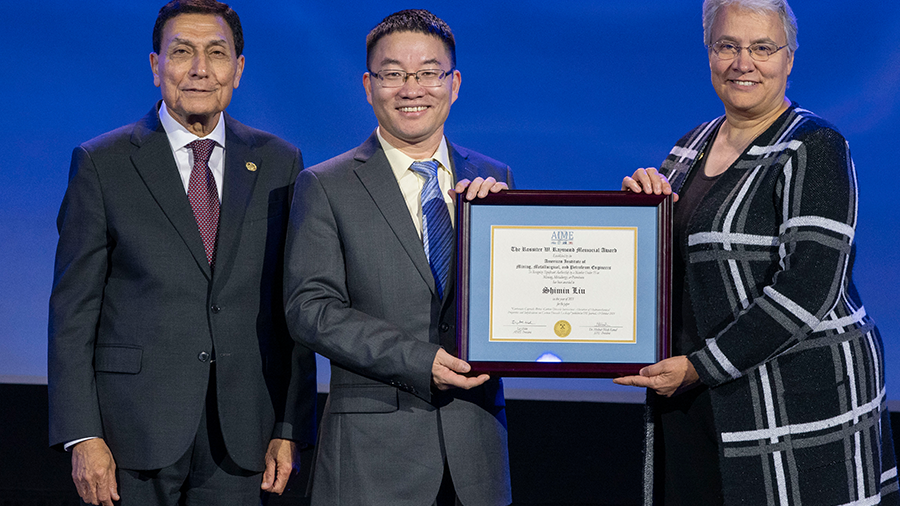Best Paper Award from Society of Petroleum Engineers goes to Professor and Recent Alum

Penn State Awards and Recognition
Shimin Liu, an esteemed professor of energy and mineral engineering at Penn State, has been conferred with the prestigious Rossiter W. Raymond Memorial award. This award, granted by the Society of Petroleum Engineering (SPE) and the American Institute of Mining, Metallurgical, and Petroleum Engineers (AIME), is in recognition of Liu’s outstanding research paper in the field of AIME. The award ceremony was held during the 2023 SPE Annual Technical Conference & Exhibition in San Antonio, Texas.
The Award-Winning Research Paper
The paper titled, “Carbonate Caprock–Brine–Carbon Dioxide Interaction: Alteration of Hydromechanical Properties and Implications on Carbon Dioxide Leakage,” delves into the long-term integrity of carbon caprock. Carbon caprock is integral to the process of geological carbon sequestration – a method used for carbon management wherein CO2 is securely trapped in subsurface formations.
Importance of the Research
Carbon sequestration, also known as carbon storage, is an emerging field seeking innovative solutions to climate change. The process involves the capture of CO2 from energy systems and its strategic storage in the Earth’s subsurface formations. The burgeoning interest in this field has led analysts to project that the carbon capture, use and storage market will surge to $14.2 billion by 2030.
Key Aspects of Carbon Sequestration
Liu underscores the need for extensive research to ensure the safety and effectiveness of carbon sequestration. He states that it’s crucial to address potential hazards such as contamination of aquifers or seismic risk caused by excessive leakage. The aim of the research is to understand how stored carbon can alter the caprock structure within geological formations which will enhance the process of carbon sequestration.
The Study and its Findings
The study focuses on carbon caprock, a common denominator among potential storage sites worldwide. Understanding the interaction of caprock with brine, a mineral-rich ionized water that occurs naturally along CO2 injection, is critical in determining caprock’s long-term integrity. Their research unveiled that brine-carbon interactions increased the porosity of the rock, which could eventually lead to CO2 leakage. These findings can provide crucial data for decision makers considering future project implementation in formations with carbonate as caprocks.
Future Research Directions
Both Liu and Sang have expressed enthusiasm to continue exploring the potential of carbon sequestration in greater detail. Their future research will focus on gaining a richer understanding of how the interaction between brine and carbon affects porosity and finding solutions to ensure the safe storage of CO2.
Contributions of SPE and AIME
The Society of Petroleum Engineering (SPE) and AIME are instrumental in fostering advancements in the field of oil, gas, and related energy resources. Their contributions extend to awarding scholarships and special grants, and providing national visibility and representation within the larger engineering and scientific community.
—
Read More Pennsylvania News



Leave a Comment